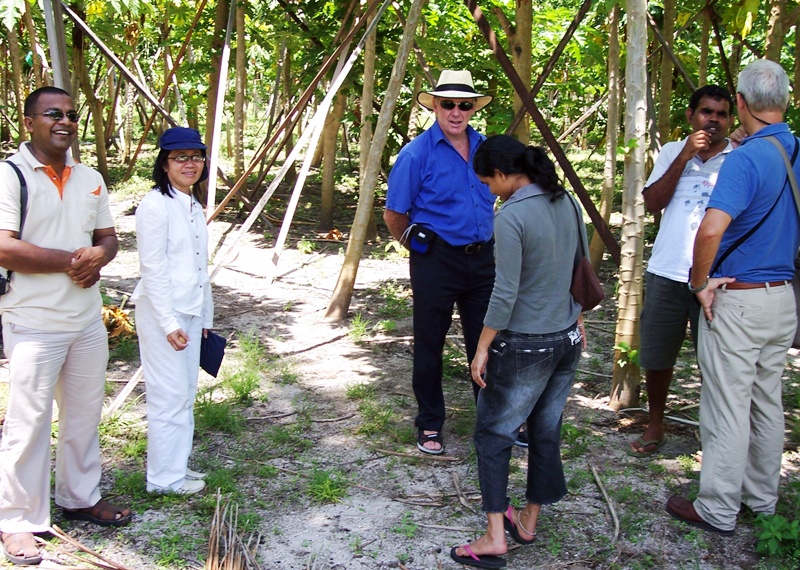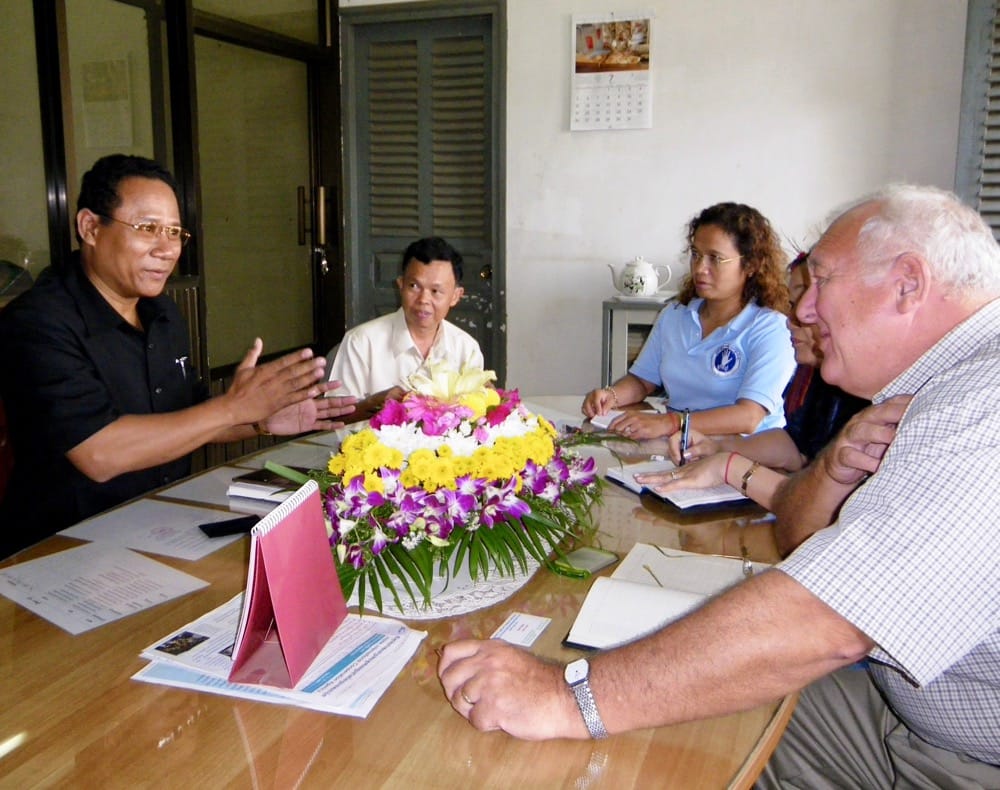8 Reasons Why International Consultants Fail
International consulting can be one of the most rewarding parts of a career. But as with most endeavours, the rewards are equal to what you bring to the table. And botching up is really easy, so real care and thought must be taken before you step on the plane.
Remember, the product you sell to the client is YOU. Your skills, your experience, your history, your contacts, your ways of doing things all matter. Yes, mind your manners.
We have been in this business for 40 years. Development Banks, Aid Agencies, National Development Agencies, NGOs, private sector, whatever and we may not have seen it all, but we've watched the career ending idiocy of a whole range of consultants, many very talented, as they plunged to earth in flames or were helped to the airport. So please listen up.
We have been in this business for 40 years. Development Banks, Aid Agencies, National Development Agencies, NGOs, private sector, whatever and we may not have seen it all, but we've watched the career ending idiocy of a whole range of consultants, many very talented, as they plunged to earth in flames or were helped to the airport. So please listen up.
In our experience, International consultants often fail because:
1. They think they are brighter than the folks they're advising.
They don't realise nor accept that intelligence is spread fairly evenly over all nations and that what they bring new to the table is either a very narrow and specific new skill or a view of the same series of problems from a different angle and perspective.
The new view may provide some hints for undoing a reef knot in the new country. The pompous peacocking of arrogant and insensitive advisers really limits the effectiveness of other consultants as they make them look affected and silly.
The fact that a consultant has been brought in means that some of the folks want some help. The prima donna stunter rubs it in and builds real resentment.
1. They think they are brighter than the folks they're advising.
They don't realise nor accept that intelligence is spread fairly evenly over all nations and that what they bring new to the table is either a very narrow and specific new skill or a view of the same series of problems from a different angle and perspective.
The new view may provide some hints for undoing a reef knot in the new country. The pompous peacocking of arrogant and insensitive advisers really limits the effectiveness of other consultants as they make them look affected and silly.
The fact that a consultant has been brought in means that some of the folks want some help. The prima donna stunter rubs it in and builds real resentment.
2. They often criticise the situation in the country they are working and forgetting that often the same things happen in their own country.
Memory can be very short. Even if it is an unusual circumstance, criticising or boasting about how well other countries have done is not going to help. The problem is why the consultant was hired!
The other day, I saw a famously self-important advisor leave a consultation with the smile of success. The 6 people left in the room looked at each other with empty stares wondering what on earth had just happened.
Simple good manners would have avoided this but the constant boast of how great things were in her home country and how terminally horrible was the entire country she was working in now absolutely shotgunned any positive impact from a rather decent presentation.
Memory can be very short. Even if it is an unusual circumstance, criticising or boasting about how well other countries have done is not going to help. The problem is why the consultant was hired!
The other day, I saw a famously self-important advisor leave a consultation with the smile of success. The 6 people left in the room looked at each other with empty stares wondering what on earth had just happened.
Simple good manners would have avoided this but the constant boast of how great things were in her home country and how terminally horrible was the entire country she was working in now absolutely shotgunned any positive impact from a rather decent presentation.
3. Their expectations are unrealistic.
They often think things happen in the same way as in their own more developed environment. They expect the resources to be there when they need it. They ask for data when there are none. They arrive 5 minutes before a presentation and complain if everything isn't set up.
4. They are impatient for results.
In many countries hiring Consultants, things don't happen fast. The skills in many offices are limited so, responses are often slow. As well, the bureaucracy is such that decisions can only be made at the top so getting decisions is very slow. English may not be very common, so tiny step progress is inevitable.
They often think things happen in the same way as in their own more developed environment. They expect the resources to be there when they need it. They ask for data when there are none. They arrive 5 minutes before a presentation and complain if everything isn't set up.
4. They are impatient for results.
In many countries hiring Consultants, things don't happen fast. The skills in many offices are limited so, responses are often slow. As well, the bureaucracy is such that decisions can only be made at the top so getting decisions is very slow. English may not be very common, so tiny step progress is inevitable.
5. They apply for jobs with deliverables they have very minimal experience in.
In one project we had been involved in, there was a consultant who took on institutional management but he had never managed anything more complex than his garage.
This gap became apparent in the middle of the project when the only substance provided was book references and not experience stories. It even became worse when he covered up his incompetence by criticising the team leader's approach and complained about this even to the employer.
Some lack top management experience and take on jobs advising top management. They are unable to be useful having no first hand experience to offer alternatives, approaches, and ways of handling sticky situations or creating and presenting positions, leveraging resources and making compromises.
In one project we had been involved in, there was a consultant who took on institutional management but he had never managed anything more complex than his garage.
This gap became apparent in the middle of the project when the only substance provided was book references and not experience stories. It even became worse when he covered up his incompetence by criticising the team leader's approach and complained about this even to the employer.
Some lack top management experience and take on jobs advising top management. They are unable to be useful having no first hand experience to offer alternatives, approaches, and ways of handling sticky situations or creating and presenting positions, leveraging resources and making compromises.
6. They just don't want to be bothered with the employers' requirements.
When asked to perform tasks they won't depart from the norm in their home country. They don't understand that their own behavior is one of the best consulting tools they have.
Once, one of our consultants in the team just wandered away, gone from the project without saying anything. Another time, one of the Team, after submitting his report, spent the time remaining in his assignment at a resort on an Island with his phone turned off.
No one knew where he had gone, so whatever feedback came from the client was not passed on until the last day of his assignment. He demanded more pay if they wanted him to revise his report and guaranteed he would not be hired again in that country.
When asked to perform tasks they won't depart from the norm in their home country. They don't understand that their own behavior is one of the best consulting tools they have.
Once, one of our consultants in the team just wandered away, gone from the project without saying anything. Another time, one of the Team, after submitting his report, spent the time remaining in his assignment at a resort on an Island with his phone turned off.
No one knew where he had gone, so whatever feedback came from the client was not passed on until the last day of his assignment. He demanded more pay if they wanted him to revise his report and guaranteed he would not be hired again in that country.
7. They don't update the client on the progress of the assignment and just hand the final report to them at the end of their assignment. When this happened once, the client rejected the report claiming that the direction was not where they wanted to go and the company that hired this Consultant had to send another person to do the work all over again. Hiding in your office is lethal!
8. If you're lucky enough to have a contract in a developing country, whatever your language of comfort, may not be theirs.
English or French or Mandarin? Use your language skills to select simplicity. No clever word plays. No nightmare adventures into the subjunctive. No iceberg of stacked clauses. Subject then verb. Your Churchillian style may be a matter of pride to yourself but it is a fog of silliness to the client. If they do not understand, you have failed!
The take away is: if you want to be a Messiah, stay home and fight with your mirror. Give those who love international work a break.
Or, practice a bit of humility before you get on the plane.
8. If you're lucky enough to have a contract in a developing country, whatever your language of comfort, may not be theirs.
English or French or Mandarin? Use your language skills to select simplicity. No clever word plays. No nightmare adventures into the subjunctive. No iceberg of stacked clauses. Subject then verb. Your Churchillian style may be a matter of pride to yourself but it is a fog of silliness to the client. If they do not understand, you have failed!
The take away is: if you want to be a Messiah, stay home and fight with your mirror. Give those who love international work a break.
Or, practice a bit of humility before you get on the plane.
Related Articles:
Have you done international consulting? What has been your experience?


